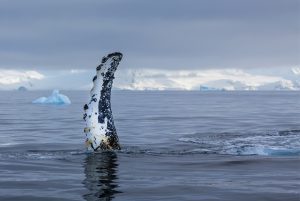Dr. Boris Worm is a professor at Dalhousie University in Nova Scotia, and one of the co-authors of the study. (Photo: Nick Hawkins/OceanSchool)
To highlight this “remarkable resilience,” Worm points to one of hundreds of case studies.
“One that I like to cite is the recovery of coral reefs in the Bikini Atoll in the Marshall Islands,” he says. The Bikini Atoll was a nuclear testing site for the United States between 1946 and 1958. Twenty-three nuclear weapons were detonated, yet 70 years later, corals and fish are flourishing.
“There are few places that are more pristine than this place that was literally bombed to bits,” says Worm.
While in Indonesia last year, Worm visited coral reefs that were also previously subjected to systematic bombing by fishermen — a process that was banned 20 years ago. Within a decade, the reefs had begun to show signs of recovery, and the progress he observed in 2019 was astounding.
“You can still see where the bombs were thrown and you still see the rubble, but from that rubble emerges a new reef at a speed and abundance that I frankly did not expect,” he says. “It made me very hopeful.”
This optimism is shared by Duarte, who agrees that the global outlook on the ocean’s health and its ability to recover has been historically pessimistic. “If you put your ear next to the tracks, you can actually hear a wave of recovery in the ocean coming,” he says.
Biodiversity speeds recovery
The resiliency of ocean ecosystems can be explained by a number of factors, says Worm. For starters, few ocean species have become extinct.
“We still have all the pieces to rebuild the whole,” he says, adding that because all oceans are connected, they are able to recover much more quickly than ecosystems on land. Bikini Atoll was recolonized by larvae and sharks that drifted in from elsewhere. On land, ecosystems are much more separate.
Another reason ocean species bounce back easier is that a lot of them are fast-growing, he adds. On land, forests can take decades or centuries to grow back and be full-flourishing again. In the ocean, phytoplankton can double in abundance within a few days.
“We often see these fairly rapid recoveries if we give the ocean a chance to build on its innate resilience,” Worm says.
Climate change remains a threat
Worm cautions that there is a major threat that could throw a wrench in this automatic recovery process: climate change.
Climate change threatens primary production in the ocean in that it curbs the nutrient supply by making the water column more stratified, he explains. When nutrients at greater depths are not circulated up into the sunlit zone, phytoplankton growth slows.
“With warmer waters, we do observe that process being slowly reduced. That worries us,” Worm says. “With no nutrients, there is no phytoplankton; there is no food.”
There is already an urgent need to address climate change for the future security and health of human life and land-based ecosystems; the ocean will be a beneficiary of any actions taken.
“There is a time question here,” says Worm. “How quickly can we address climate change and will it be enough for the full ocean recovery we envision by 2050?”
Outlining the solutions
In addition to the five broad actions outlined above, the researchers also identified nine “rebuilding wedges” that should be areas of focus in preserving marine life, which are salt marshes, mangroves, coral reefs, kelp, oyster reefs, fisheries, megafauna and the deep sea.
As an “ocean superpower” with the longest coastline in the world and three ocean basins, Canada is uniquely positioned to lead global efforts to restore marine health. Recent strides have been made to protect large parts of the unique and highly productive Arctic Ocean; the same needs to be done in Canada‘s Atlantic and Pacific waters, Worm says.
“We are ocean people. We are an ocean nation,” he says, “and I think we are slowly waking up to that fact — seeing that potential that the ocean provides.”







